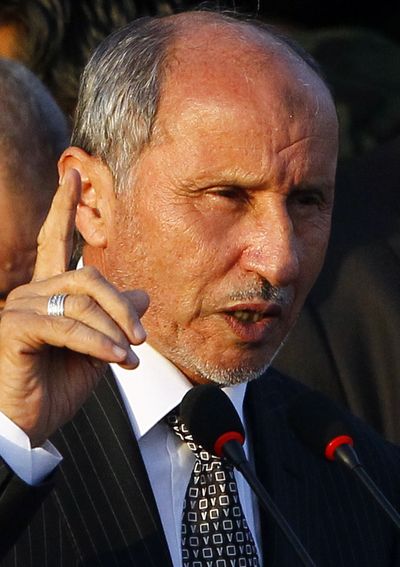Libya’s transitional leader signals central role for Islam

BEIRUT – Libya’s new leaders declared their nation “liberated” on Sunday, paving the way for elections and a constitution that the revolutionary government says will put the country on a path to its first representative democracy.
The long-awaited pronouncement came with a heavy dose of Islamist sentiment, as Mustafa Abdul-Jalil, leader of the transitional government, embraced the Muslim code known as Shariah as a foundation for future legislation.
During a reign of more than four decades, Moammar Gadhafi viewed Islamists as a threat and jailed hundreds of suspected religious militants. But Jalil, a former justice minister in Gadhafi’s regime, signaled that Islam would have a central place in the new Libya, imposing two Islamic-style edicts – capping interest rates and lifting restrictions on how many wives men may have.
Islamists are one of a number of groups seeking a stake in the new Libya. Many Libyans are also advocating a secular state. The transitional leaders have repeatedly stressed the nation’s “moderate” version of Islam, and dismissed as far-fetched the notion of an Iran-style theocracy emerging in Libya. Still, some Western leaders who backed the rebellion have voiced concern about the possible rise of fundamentalist rule in Libya.
The liberation declaration in the eastern city of Benghazi – where mass protests in February ignited what became a national rebellion – came three days after Gadhafi was slain in his home city of Sirte when rebels overran the coastal town. The suspicious circumstances of his death continue to draw international concern.
Libya’s provisional leaders say Gadhafi was killed in battle or in crossfire after he was captured. But footage of a bloodied Gadhafi being manhandled and taunted while a prisoner has raised suspicions that he may have been executed.
The former leader’s decomposing body has remained on display in a vegetable cold-storage locker, a macabre spectacle that has unnerved some observers – though many Libyans have called it cathartic.
The Obama administration has joined with the United Nations in calling for an investigation into Gadhafi’s death, expressing concern for what his treatment may portend in the new Libya.
Reuters reported Sunday that Gadhafi’s son Saadi said he was “shocked and outraged by the vicious brutality” against his father and brother Mutassim, who was also captured alive in Sirte and ended up dead under murky circumstances. A lawyer for Saadi Gadhafi, a onetime aspiring Hollywood producer who fled to the African nation of Niger, denounced the “barbaric executions and grotesque abuse of the corpses.”
The demise of the longtime ruler, however, has been greeted with exultation inside Libya. Officials have pledged that Gadhafi’s remains would be turned over to Gadhafi tribesmen for burial.
Whatever form of government emerges, it is clear that Libya is about to undergo a radical overhaul.
A major challenge will be to form some kind of consensus government despite regional and tribal differences. The nation is awash in weapons. The nation’s new leaders hope to disarm the many militias that ousted Gadhafi and funnel their members into a new military and police corps.
While Arab Spring revolutions also triumphed in neighboring Tunisia and Egypt, ousting entrenched autocratic rulers, both nations had functioning government structures, including militaries, that survived their respective revolutions. In Libya, however, Gadhafi’s regime left few formal traces of government behind.
Libya’s new leadership must create a government almost from scratch. Many among the Gadhafi-era elite – including relatives and cronies of the leader – have been toppled, gone into hiding or fled the country.
Libyans also face a substantial rebuilding challenge. Several cities, including the coastal towns of Misrata and Sirte, and the mountain city of Zintan, were damaged to a degree unlike anything experienced during the revolutions in Egypt or Tunisia.
It was not immediately clear when Libya’s first elections would be held, though some have called for national polling within eight months. The full transition to a new democratic leadership has been projected to take two years.